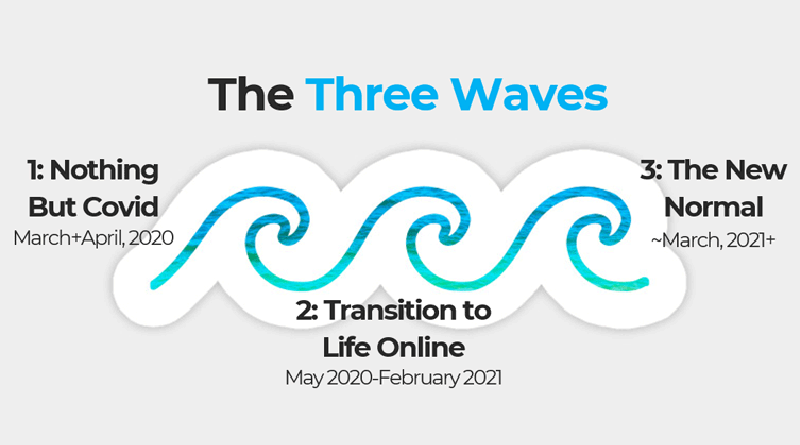Read The Room
When folks ask me about how best to do marketing right now, my answer is consistently turning into the same three words: Read the room.
Imagine you’ve walked into a religious space. This room is sacred to the people inside it. When you speak, whatever you say will be viewed through the context of where you are. That’s exactly what Covid-19’s done to our planet.
The world—the whole world—is experiencing this crisis all together. When you send a tweet, write an email, publish a blog post, run a webinar, broadcast or amplify anything right now, you’re sending that message within the context of the Coronavirus outbreak. I’d estimate we have (at minimum) another month where nothing in our lives exists without the filter of the viral crisis and the pains and restrictions it inflicts.
The signs are everywhere. An overwhelming majority of the traditional participants in April Fool’s Day have wisely and collectively decided not to celebrate this year. Every major online platform has taken immense, unprecedented steps to amplify the dangers of the Coronavirus, dampen false information, fact-check like never before, and create resources to help. Brands big and small are doing likewise. Celebrity culture has shifted almost entirely to messaging about the need to stay home. The words “unprecedented” and “crisis” finally mean something again. If we’re very lucky, every disaster for the next century will be compared against this one we’re living through.
That’s “The Room.”
We don’t need marketing, content, advertising, or messaging of any kind that’s ignorant of or unsympathetic to this filter. When that stuff exists, it’s (rightfully) getting ignored, or worse, reflecting badly on its creators.
I get it. I *want* to have some sense of normalcy, some space away from the drumbeat of increasing death, increasing length of quarantine, increasing risk to our global and national economic health. Damn, I really want it. And, sometimes, in personal ways, I get that escapism. I hop on a phone call with friends, or watch a dumb TV show, or play video games, or scroll through photos of my friends’ kids on Instagram.
But what I can’t, what *we* can’t reasonably expect is that our marketing is being received in the same context as escapism-centric content. So, instead, we have to be mindful. We have to read the room. And we have to respond, accordingly.
How to Read this Room
Great marketers deeply understand three things:
- Their audience
- Their company’s positioning—what painful problem they solve, why their solution is superior, and how it contrasts to others
- How and where to message #2 to #1
That understanding comes from getting to know our market, our customers, their needs and problems, how they solve them today. The Covid crisis demands that we rapidly expand our empathy: we feel what our customers are feeling, what our customers’ sources of influence (press, media, journalists, social influencers, podcasters, YouTubers, talking heads on webinars & TV, et al) are feeling, what everyone is sharing in, and we respond accordingly.
Tactically, I recommend the following:
Don’t stop marketing. As HBR points out, “On average, increases in marketing spending during a recession have boosted financial performance throughout the year following the recession.” What’s more, the marketing you do helps halt the dangerous decline in consumer & business spending that can create future crises.
Do stop purely self-promotional marketing. No matter what you do, you need to find a way to relate it to the help you’re providing, the situation you’re improving. If you’re selling, sell the benefits that appeal to the moment or show how, when you sell, you’re giving back and making life better and easier for others.
Don’t create only crisis-related content. It’s OK to write about, tweet about, talk about other things. When we socialize at funerals, we don’t exclusively talk about the deceased, but what we do talk about is informed and aware of the event’s context.
Audit your marketing. You might have just launched some timely, empathetic content that nails the moment… but left up your unfortunate, tone-deaf “subscribe now!” popup. Double-check your entire marketing experience for messaging that doesn’t make sense right now.
Don’t amplify harmful or dangerous activities. Want to speculate about how necessary the latest quarantine restrictions are or whether its worth sacrificing some lives so we can go out to bars & ball games? Keep it on your personal Facebook (or hell, just keep it off the Internet). It’s also not the right time to directly promote travel, in-person events, or gathering places of any kind. But, it’s a great time to indirectly build brand affinity and goodwill for even those businesses (some examples below).
Do show how you’re helping. Opinions on this vary, and I know some folks prefer organizations and individuals keep their selfless acts truly selfless by keeping them quiet. I disagree, mostly because social sciences show us that the best way to encourage more altruism and helpful acts is to model them over and over.
Read the rest here: https://sparktoro.com/blog/read-the-room/.



